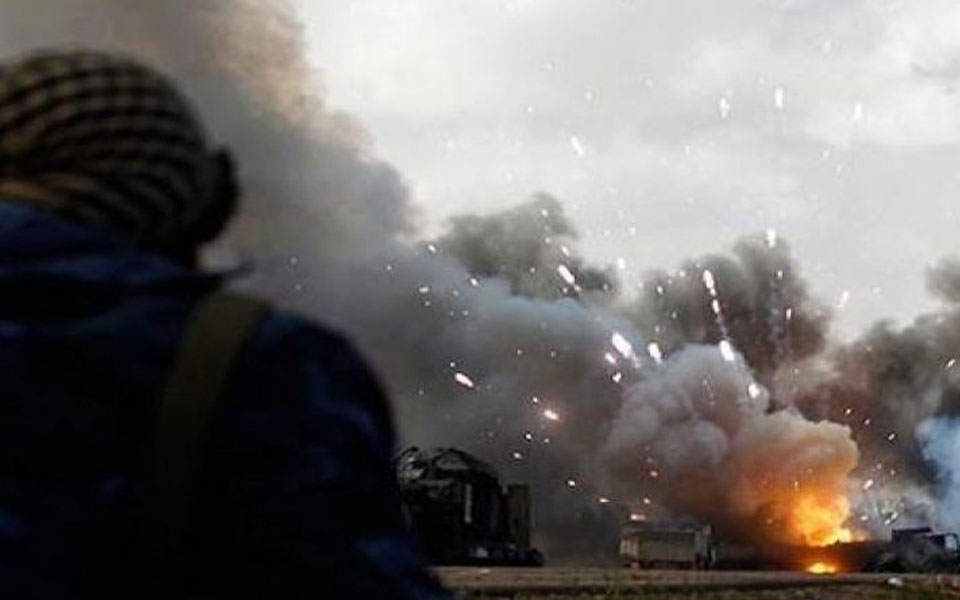Benghazi, Apr 20: Fighting between rival Libyan forces for control of Tripoli escalated in the past couple of days, a spokesman for the self-styled Libyan National Army said Saturday, as the death toll rose to at least 220, including combatants and civilians, since the LNA declared a major military offensive to take the capital earlier this month.
Fighting erupted April 5 pitting the LNA, led by Field Marshal Khalifa Hifter and aligned with a rival government in the east, against militias affiliated with Tripoli's U.N.-supported government.
Ahmed al-Mesmari, LNA spokesman, told a news conference in the eastern city of Benghazi that heavy clashes have been underway between his forces and rival militias in the towns of Swany and al-Aziziya, south of Tripoli, which Hifter's forces seized earlier this month.
He said militias allied with the U.N.-supported government launched airstrikes on the Al Watiya air base, southwest of Tripoli. There were also airstrikes on the town of Gherian, he said.
Residents in Tripoli said Hifter's forces seem to be making small progress and gains on the ground. They said fighting has been ongoing in residential areas, a few kilometers (miles) south of Tripoli. Both sides have used heavy artillery and airstrikes, they said.
The residents spoke on condition of anonymity for security reasons.
The fighting has killed 220 people, including civilians, since Hifter declared his offensive on April 5, the U.N. health agency said Friday. The World Health Organization said that 1,066 others have been wounded.
President Donald Trump phoned Hifter earlier this week, expressing U.S. support for the leader's perceived stance against terrorism.
A White House statement Friday said: "The President recognized Field Marshal Haftar's significant role in fighting terrorism and securing Libya's oil resources, and the two discussed a shared vision for Libya's transition to a stable, democratic political system."
AP reporters saw Hifter's foreign minister Saturday in the Tunis hotel where he was staying, but the press conference he had scheduled was postponed at the last minute.
His press service distributed a statement saying it was because of "developments in Libya and the positive and fast-advancing evolution of events."
The statement did not elaborate but said a new press conference would be arranged at a later date. The Tunisian Foreign Ministry spokesman suggested that the Libyans hadn't requested permission from Tunisia's government to hold the news conference.
Tunisian Foreign Minister Khemais Jhinaoui has intensified contacts in recent days with U.N. envoy Salame and various Libyan parties, calling on them to cease hostilities and resume negotiations. Tunis is officially neutral in the Libyan conflict and has hosted repeated diplomatic negotiations on Libya's future.
Tunisia wants to hold a meeting among the top diplomats of Egypt, Algeria and Tunisia in the coming days to discuss ways to solve Libya's crisis.
The battle for Tripoli could ignite civil war on the scale of the 2011 uprising that toppled and killed longtime dictator Moammar Gadhafi. Since Gahdafi's ouster, Libya has been governed by rival authorities in the east and in Tripoli, in the west, each backed by various militias and armed groups fighting over resources and territory.
Let the Truth be known. If you read VB and like VB, please be a VB Supporter and Help us deliver the Truth to one and all.
Dubai: Smoke was seen rising from an area near the United States Consulate in Dubai, according to witness accounts cited by Reuters.
There was no immediate official confirmation on the extent of damage or whether there were any casualties in the incident.
Earlier, the US embassy in Riyadh, Saudi Arabia’s capital, was also attacked. Authorities reported damage to the premises, but no casualties were recorded.
The developments come amid heightened tensions in the region, with Iran continuing to target US interests in the Middle East following deadly attacks launched on Saturday by Israel and the United States.
Near US embassy in Dubai pic.twitter.com/z5VTZNVxNO
— Sahil Shah (@thesahilsshah) March 3, 2026





